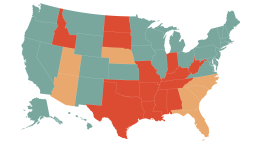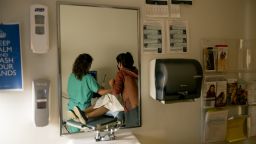The Texas Supreme Court on Monday reversed a lower court’s ruling that would have allowed a woman to obtain an abortion under the state’s “medical emergency” exception, though the woman’s attorneys hours earlier said she had left the state to have the procedure.
Kate Cox sought the abortion after learning her fetus has a fatal condition and doctors told her she could risk her future fertility if she doesn’t get the procedure. A state judge last week ruled Cox, who is 21 weeks pregnant, could terminate her pregnancy — but the Texas Supreme Court temporarily put that ruling on hold late Friday.
On Monday, the Center for Reproductive Rights announced the 31-year-old mother had left Texas to get health care elsewhere following what the group that represents Cox described as “a week of legal whiplash.”
Then, hours later, the state’s high court ruled against her.
The ruling calls into question whether the decision could deter women in similar situations from seeking a court-authorized abortion. Cox’s lawsuit is believed to be one of the first attempts in the country by a person seeking a court-ordered abortion since the Supreme Court overturned Roe v. Wade last year, according to the New York Times.
While the center did not disclose more details of Cox’s plans, she had received “offers to help her access abortion elsewhere, from Kansas to Colorado to Canada,” its statement said.
Cox wants her care “the fastest way” possible, her attorney said.
The ‘medical emergency’ exception
On Thursday, a state district court judge sided with Cox and granted a temporary restraining order against the state so she could legally have an abortion under the state’s “medical emergency” exception. Texas has a near-complete abortion ban with narrow exceptions.
Texas Attorney General Ken Paxton, a Republican, quickly threatened criminal prosecution against doctors or hospitals who would help facilitate the abortion, saying they could face charges even after the 14-day temporary restraining order. CNN has reached out to Paxton’s office for comment.
Late Friday night, the state’s high court temporarily blocked Cox from obtaining an abortion while it reviewed the case.
In its ruling late Monday, the Texas Supreme Court – comprised of nine Republicans – called on the state’s medical board to provide more guidance on the “medical emergency” exception at the heart of Cox’s case.
The high court also released an opinion, saying Cox’s doctor did not establish or attest that Cox’s symptoms were life-threatening and noting it should be up to doctors – not judges – to decide whether to provide an abortion.
“No one disputes that Ms. Cox’s pregnancy has been extremely complicated. Any parents would be devastated to learn of their unborn (fatal condition) diagnosis. Some difficulties in pregnancy, however, even serious ones, do not pose the heightened risks to the mother the exception encompasses,” the opinion states.
“The exception requires a doctor to decide whether Ms. Cox’s difficulties pose such risks,” the ruling continues. “(A doctor) asked a court to pre-authorize the abortion yet she could not, or at least did not, attest to the court that Ms. Cox’s condition poses the risks the exception requires.”
A separate case pending before the Texas Supreme Court seeks clarity on the “medical emergency” exception. Notably, in its opinion, the court called on the Texas Medical Board to provide further guidance on the law.
“The courts cannot go further by entering into the medical-judgment arena. The Texas Medical Board, however, can do more to provide guidance in response to any confusion that currently prevails,” the opinion states. “Each of the three branches of government has a distinct role, and while the judiciary cannot compel executive branch entities to do their part, it is obvious that the legal process works more smoothly when they do.”
Fears for woman’s health and future fertility
For Cox, “this past week of legal limbo has been hellish,” Nancy Northup, president and CEO at the Center for Reproductive Rights, said in a statement. “Her health is on the line. She’s been in and out of the emergency room and she couldn’t wait any longer.
“This is why judges and politicians should not be making health care decisions for pregnant people – they are not doctors.”
Texas’ “medical emergency” exception allows for an abortion if the mother has a “life-threatening” physical condition while pregnant or has “a serious risk of substantial impairment of a major bodily function.”
Critics argue the statute is too vague and has a chilling effect on doctors who fear criminal prosecution.
The same legal group representing Cox – the Center for Reproductive Rights – is also representing a group of women and physicians before the Texas Supreme Court in the lawsuit seeking clarity. The state argues the law is adequate.
Cox has been to the emergency room four times in the last month due to symptoms like severe cramping, diarrhea, leaking of fluid and elevated vital signs, her attorney said. And because she’s already delivered two children via C-section, her physicians have warned she is at high risk for complications, including possible uterine rupture in future pregnancies.
This pregnancy would need to be delivered via another C-section, which Cox fears could jeopardize her health and future fertility, her attorneys said.
Additionally, the fetus has trisomy 18, a fatal genetic condition sometimes called Edwards syndrome that can cause heart defects and other organ abnormalities. In at least 95% of cases, the fetus doesn’t survive full-term and the pregnancy ends in miscarriage or stillbirth, according to the Cleveland Clinic.
Paxton argued Cox has not established her symptoms as to meet the “life-threatening” criteria in the law.
The filing from his office stated Cox inquired about getting an abortion only after learning her fetus might not survive the pregnancy or long afterward and already knew she might need another C-section before her current pregnancy.
“Plaintiffs plead no facts linking Ms. Cox’s physical condition related to the birth of this child to the loss of fertility. Instead, it appears she will face the same risks regarding the birth of any future child,” the filing states.
State says doctor’s opinion ‘is not enough’
As his office has done in the broader case on this issue before the state Supreme Court, Paxton’s attorneys also argued “a fatal fetal condition does not meet the medical exception,” adding the exception applies only to the mother’s condition.
Paxton’s office also said none of the physicians who have treated Cox in the Dallas-Fort Worth area have recommended an abortion.
Dr. Damla Karsan, a Houston-based physician – and a plaintiff in the other case – is cited in legal filings as having reviewed Cox’s medical records, recommended the abortion and agreed to provide the medical care.
The state wrote in the filing Karsan’s recommendation “is not enough.”
“What he’s (Paxton) saying is that physicians in Texas shouldn’t be practicing medicine,” said Molly Duane, an attorney at the Center for Reproductive Rights. “Ken Paxton is practicing medicine – because that’s what he wants – he wants to review her medical records. He wants to decide if he thinks she’s sick enough.
“When people tout the medical exceptions to abortion bans as meaning that the abortion bans are OK, and that people who really need care are still getting it, that’s a lie.”
The case shows why “it is completely untenable for patients to have to come to court and ask for court authorization for lifesaving medical care,” she said. “It’s simply outrageous and people should be outraged but what is happening in Texas right now.”
This story has been updated with additional information.
























